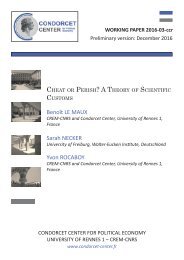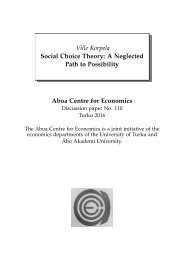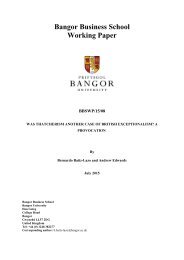MEMORANDUM
n?u=RePEc:hhs:osloec:2016_018&r=hpe
n?u=RePEc:hhs:osloec:2016_018&r=hpe
You also want an ePaper? Increase the reach of your titles
YUMPU automatically turns print PDFs into web optimized ePapers that Google loves.
several topics is very similar to that given in the present article.” (Econometrica<br />
4 (1), p.39).<br />
This was a rare case of priority conflict in Econometrica or just a touch of it. Staehle<br />
was on his way to become a renowned expert on index numbers. Leontief’s article was<br />
published as quickly as possible; it appeared as article no. 2 in the issue, after the annual<br />
survey of theory always placed first in the issue; in this case it was by Frisch on the<br />
problem of index numbers (Frisch 1936).<br />
The editorial incident had an aftermath sixty years later. In an article by Paul<br />
Samuelson in a book published 1995, he wrote as follows:<br />
“Ragnar Frisch was pretty much autonomous editor of the early issues of<br />
Econometrica. He was interested in everything. Also, he believed in the<br />
superiority of his interpretations of anything and everything. [Indeed, he was so<br />
great a mind that there was much merit in such belief.] When Wassily Leontief<br />
participated in the post-1933 revival of the economic theory of index numbers (à<br />
la Konüs, Staehle and others), Frisch held up publication of the Leontief 1936<br />
contribution until he could publish in the same issue of Econometrica his own<br />
survey article on the subject. Foul play, I say.” (Samuelson 1995, p.23).<br />
Samuelson had great admiration for Frisch but his assertion was utterly false.<br />
Frisch had not held up the publication of Leontief’s paper but on the contrary hastened<br />
it by shortcutting the refereeing process. And he was glad to have his paper published<br />
side by side with Frisch’s article. 224 There was no foul play. 225<br />
1936 and 1937: The two REStat articles<br />
In February 1936 it was again time for submitting applications to the Committee. It<br />
was crucial for Leontief to apply again for a grant that would allow him to complete the<br />
1919 table. The application referred to the Committee’s decision in 1935 to postpone the<br />
decision concerning the grant of an additional appropriation for the completion of the 1919<br />
table. Leontief had solicited the support of Professors Edward Gay, John H. Williams and<br />
William L. Crum who had been briefed and supported the request for a grant to complete<br />
the table.<br />
The application made it clear to the Committee that the postponement had resulted in<br />
the loss of Maynard Heins’ assistance: “The necessity caused by anticipated lack of funds<br />
224 Leontief to Nelson, 20 Nov. 1935.<br />
225 Leontief’s had a longer history; it had been submitted to Journal of Political Economy early in<br />
1934. The editor, Frank Knight, had after refereeing invited a revise and resubmit to which Leontief<br />
did not respond, perhaps because he found the anonymous referee too unappreciative of his ideas.<br />
103





